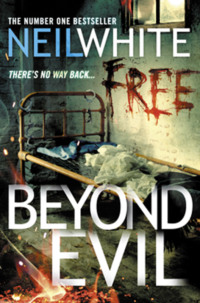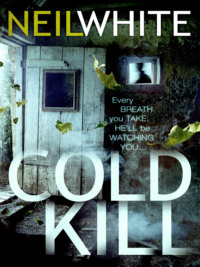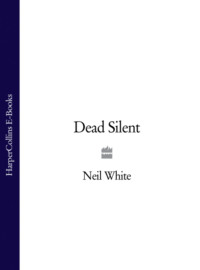
Полная версия
LAST RITES
It had played out in the local paper for a few days, had even brushed the nationals, but the television got the best angle – the news conferences, Mr and Mrs Goode tearful and scared, begging for Sarah to come home – but then it went quiet when there was nothing new to report. I'd guessed the subtext: it was officially a missing persons investigation, but, for the police, Sarah Goode was a murderer on the run.
‘This is Jack Garrett,’ Sam said. ‘Our local hotshot reporter.’ When I didn't respond, he added, ‘They want to speak to you. Is that okay?’
I nodded at them politely, but then I asked Sam, ‘Why me?’
Sam looked embarrassed. ‘It's probably for the best if they tell you about it.’ He went towards the door. ‘I'll be in the next room if you need me.’
I watched him go, surprised, and wondered why he didn't want to be a part of it. When the door clicked shut, Sam left behind an uncomfortable silence, broken only by the ticking clock on the wall and the creaks of the chairs as Mr and Mrs Goode shuffled nervously.
I tried to weigh them up. They were in their fifties. She was in a blue suit, knee-length skirt and blazer, navy blue with gold buttons, her hair in tight grey curls. He looked uncomfortable in a dated brown suit, as if he hadn't worn one for a long time, and I could see the shirt collar digging into his neck. His sandy hair had receded to just wisps of a comb-over.
‘This is about Sarah, I presume?’ I said.
They glanced at each other, and I saw a nod, a look of comfort. It was Mrs Goode who took the lead.
‘Yes, it's about our daughter,’ she said. Her voice was firm, but the way their knees touched told me that they needed each other for support. She licked her lips and repositioned her bag on her lap. Then she said, ‘We want you to help us find her.’
It was said simply, as if she assumed I would be interested.
I wasn't. I didn't write features any more. I'd sacrificed that for family harmony, for our bright future.
I tried to sound sympathetic. ‘I'm sorry, but that's not the sort of journalism I do, the campaign stuff. I write up court hearings, that's all.’
‘But you used to do more than that,’ said Mrs Goode. ‘Mr Nixon told me about some of the stories you wrote.’
‘That was then. And I'm a reporter, not a private detective.’
‘But we thought it would be a good story if you found her,’ she pressed.
I shook my head slowly. ‘I don't see a story, not the type I write.’
They looked down, disappointed. Mrs Goode clenched her jaw and a tear dripped onto her eyelashes.
It was Mr Goode who spoke next. ‘Not even if you found her first?’ His voice was quiet, hesitant.
I gave him a smile filled with fake regret. ‘The police will have to speak to her before me, and if Sarah is charged I won't be able to write anything that might affect the case. It's called sub judice. It would just sit on an editor's desk for six months, maybe longer.’
‘There might not be a court case,’ Mrs Goode said, her eyes imploring. ‘If you could find her and bring her in, once we know what she is going to say, she might have a defence.’
My eyes narrowed at that. ‘What about Sam Nixon?’ I asked. ‘Will he speak to Sarah before she goes to the police?’
Mrs Goode looked down and didn't answer. That told me all I needed to know. It wasn't about a story, it was about Sarah's parents getting her story straight first, before she handed herself in.
‘I'm sorry, I really am,’ I said as I headed for the door, ‘but I don't see a story, not yet anyway.’
They both turned to each other and exchanged desperate looks. Mrs Goode put her hand over Mr Goode's hand and squeezed it. He looked like he was about to break down. It stalled me.
Mrs Goode turned back to me. ‘Thank you for coming down, Mr Garrett,’ she said softly. ‘At least you listened.’
‘How much have you told the police?’ I asked.
‘Whatever they wanted to know.’
I sighed. ‘If they can't find Sarah, I don't see how I can,’ I said, and this time the regret was genuine.
As I left the room I saw that Sam was waiting in one of the reception chairs. ‘How was it?’ he asked.
‘You know damn well how it was,’ I said.
‘What do you mean?’ Sam replied, as he picked at his fingers and tried to look innocent.
‘They came to you because they know the police want to arrest her for murder,’ I said. ‘Is that right?’
Sam started to say something, but then he stopped himself. He nodded and tried to shrug an apology instead, but then he realised that it was pointless.
‘They're decent people,’ he said. ‘They're worried about their daughter.’
‘And someone is dead,’ I replied harshly. ‘His family will be decent people too.’ Sam looked down, so I continued, ‘They need someone to help them find her, but they can't afford a private investigator and they thought I would come cheap. About right?’
‘But it would be a good story if you could find her.’
‘I wish it was like that, Sam, because I need the money – Laura's lawyers are taking most of what we have – but you don't understand journalism. I deal in court titbits, pub talk.’ Sam looked confused, so I said, ‘My point made. Papers want the pub tales: Man Bites Dog, that type ofthing. This is feature stuff, an in-depth analysis, and I can't afford to take the gamble of someone being interested. And anyway, if I find her, I'm the story, and that's not how I want it right now.’
Sam nodded in apology. ‘I'm sorry, Jack. They came to me for help. They're desperate people, and they're good people. You were the only avenue I could think of.’
I sighed. ‘So what's your interest?’
Sam looked sheepish at that. ‘We're struggling, Jack,’ he said. ‘We've got the work coming in, but it's all small stuff. Shoplifts, car breaks, Saturday night bust-ups. It's turnover work, but the bills come in faster than the clients.’
‘You need a murder to put you in the big league,’ I said, acknowledging his admission, and then nodded back towards the room I had just been in. ‘And so you need their daughter in a cell.’
Sam looked ashamed, but he added, ‘This is my living. I didn't kill that man, and someone has to represent her. Why not me?’
I thought about Mr and Mrs Goode and the look they both had – confused, helpless, wanting help. ‘I think they want a bit more,’ I said, and headed for the exit. ‘Thanks for the tip, Sam, but I can't see a story in it.’
Sam didn't answer, and so I was back on the street, heading towards the Magistrates Court, ready for another day of routine crime stories.
Chapter Five
As Rod Lucas pushed open the door to Abigail's cottage, the smell hit him first. It was strong, sort of smoky. Incense-burners, he guessed. His eldest daughter had gone through a phase of burning them in her room. It helped her sleep, or so she claimed at the time. It was to cover up the smell of cigarettes, he learned later. She was away at university now, and her twenty-a-day habit was one of a list of concerns.
But he remembered the cloying smell, the way it made him cough and wrinkle his nose. He could understand an experimental teenager burning them, but why a pensioner living in a remote cottage?
He looked around. Rod had expected chintz: patterned sofas, high-backed chairs, china ornaments everywhere and pictures of grandchildren, but the cottage wasn't like that. The walls were painted black, with thick red cloth covering the windows and tall mirrors on the walls, ornate and Gothic. There were candles everywhere – on the mantelpiece, the sideboards, the windowsills – everything from deeply scented ones in small jars to large black altar candles.
He saw a rug pushed up against the wall, revealing the stone floor, large slabs worn smooth over the years. His eyes widened when he saw why it had been moved, and what was in its place, the thing that dominated the space.
White lines criss-crossed the room, jagged and uneven, made up of something sprinkled onto the floor, like small white grains. There was a table and chair set in the middle of it all, as if the old lady sat in it when she was alone. Lucas stooped down to dab his finger into the lines. He tasted it. Salt.
The lines made a shape. It wasn't perfect, as if it had been done in a rush, but he could make it out: a five-pointed star, with things placed at each point. A small posy of flowers; a large red candle; a sea-shell.
Rod thought back to the explosive device. Why would anyone target this woman? Was her lifestyle the reason? This was the third explosion like this, but no one had reported anything strange in the other houses. Or maybe they just hadn't looked hard enough.
He would go to the hospital next. Maybe Abigail could provide the answers.
I shuffled on the bench at the side of the Magistrates Court in Blackley as I tried to get comfortable. It was still before ten and the court hadn't started yet, although I could hear the corridor getting busier. I looked up to the ceiling, at the flaking paint, and wondered how I had got to this point. I used to write crime features for the nationals when I was a freelancer in London, had always had the dream of writing a book, maybe ghostwriting a gangster memoir. Now, I churned out the small stories: incidents of local shame, drunken fights, domestic violence, sexual misbehaviour. The local paper paid me for each story rather than a salary, so if the crime scene went quiet, or if the police started another new initiative to keep people away from courts, then I didn't get paid. I worked my own hours, though, and it still left me to peddle the better stories to the nationals, but I used to do so much more.
But I knew that Laura was right. The stories were steady work and provided a stable home. Laura was doing the same, working regular hours, no shifts, so that we were home each evening, and there was nothing for the judge to criticise when the trial for Bobby's custody started.
I looked around the courtroom, empty apart from the prosecutor at the front, sorting out his pile of files, ready for the morning slog. The defence would arrive soon, wanting their papers for the overnight clients.
‘Anything decent for me?’ I asked.
The prosecutor looked up. ‘Uh-huh?’
He was one of the old guard; when the mood was right he was effective, but most days his job was just a plough through Blackley's grime.
‘Anything to report?’ I asked. ‘I'm not here because I like your suit.’
He smiled at that, just a glimmer. ‘Just the usual,’ he said. ‘We've got a drink-driving teacher, crashed his car leaving school, if that's any good.’
I raised my eyebrows. Another reputation ruined, but his shame was his problem. My mortgage was mine.
‘Don't get too excited, though,’ said the prosecutor. ‘Mick Boreman's defending. There'll be no guilty plea today.’
‘Too middle class to be guilty?’ I queried.
‘Something like that.’
I exhaled and sat back. I couldn't write the story properly until he was convicted. It was good for a paragraph reporting his name and profession, but not much else.
I thought about Mr and Mrs Goode as I waited for court to start. Was I right to turn down their request? Looking for Sarah would be a break from the mundane, and it might be a good feature to have written up and ready just in case she was caught and convicted. But then I thought about the bills that dropped onto the mat most mornings, how we needed the steady production line of small tales from the courtroom just to keep ahead of those, and if Geoff went all the way with his custody case then Laura's lawyers would soak up the rest, and quite a bit more.
The tapping of my pen got faster.
The family future was nearly resolved though. Anything I wrote now would be published later, long after the custody case had finished, and if the court was going to be quiet then it might be worth looking into Sarah's case, just to see if there was something to grab the headline. I could write the feature at night, after Laura had gone to bed.
I felt some guilt creep up on me as I thought of Laura, but I dismissed it, perhaps too quickly. I was a reporter; selling stories was what I did.
I put my notepad back in my pocket and rushed out of the courtroom.
Chapter Six
Sarah Goode panted as she looked around the room. Stone walls all the way round, with a door at one end, cell-like, just twenty-foot square with no windows, no view out, a dirt floor scratching her feet.
She looked up to the ceiling and then winced, shielding her eyes. The lights there were like car headlights, bright halogen on full beam, searing into her retinas.
She tried to stretch her legs, but they hurt, all cramped up. She knew she had to keep moving, had to get her muscles working again. She limped to the walls and thumped them, but the sound came back as a dead thud. They were solid, sound-proof, old Pennine stone.
Sarah felt her way round the length of the room, using the wall as support, looking for a weak spot, maybe a loose stone, until she got to the door, wooden and old, the edges uneven and dry. It was bolted on the other side; she had heard it slide back whenever he came into the room. She knew it was a man from his hacking coughs and his deep throaty laugh when he taunted her, when he had kept her in the box.
She looked over to the corner of the room. The box was still there, one end open, from where she had crawled not long before. She turned away from it swiftly and looked up at the lights again, shielding her eyes. Would they stay on all the time? She leapt at them, tried to break one just to reduce the glare, but they were too high. She hurt herself instead when she landed, the dirt cutting into the soles of her feet.
Sarah sat down and put her face in her hands, gripped her hair with her fingers. Why was she there? What had she done? Why her?
She started to pull at her hair, wanting to scream, but then she looked up, startled. She could hear the buzz of speakers. Sarah shielded her eyes to see past the lights, and then she saw them, dark shapes behind the brightness. She sat still, waiting for whatever was going to come out of them. Then the sound came out at high volume, so loud that she had to cover her ears. It was the sound of a heartbeat, fast and anxious, a relentless thump-thump, the noise pulsing around the walls.
Sarah clamped her hands tighter over her ears and screamed, tried to drown it out, but the sound still made it through, making her own heart race to keep up.
She looked back to the box. Maybe it would be quieter in there.
She turned away. She couldn't go back in there, she knew that. Her life had once been normal, but those days in the box meant that it would never be the same again.
Chapter Seven
Laura McGanity swung her bag onto her desk and sat down with a slump. She leaned back and closed her eyes for a few seconds.
‘I'm not sure I can cope with another day of this,’ she said, almost to herself.
Pete Dawson grinned at her. ‘Turning on tape machines and filling out forms not exciting enough for you?’ he said.
Laura looked at him, took in his crew cut, and the scar over his eye that was a remnant of his last jaunt with the Support Unit in the Saturday night van.
‘Don't be offended, Pete, but you don't look the agony aunt type,’ she said.
Pete laughed. He had been Laura's sidekick for most of her time in Blackley. He was an old-style detective, a head-cracker who had not yet accepted the committee style of police politics, and Laura liked him for that. Pete had learned one thing in his police career: criminals are ruthless and devious, and don't feel much remorse for those they hurt on the way. So Pete liked to let them know what he thought. Sometimes it was just a quiet word on a dark street, although it came with a snarl. Mostly it was just about being relentless, so that the criminals knew that if he became an enemy it was time to change their turf.
‘This was your choice,’ he said. ‘Regular hours.’
She rubbed her eyes. ‘It's not just that, though.’
‘If you want to have a moan,’ he said, ‘you've got around ten minutes, because the cells are full, and if we're ever going to see daylight today we need to get the first one out of the way.’
Laura shook her head. ‘I'm not talking about it,’ she said, and then she turned her head quickly when she heard laughter further along the corridor. It was the murder squad, assembled for the Luke Howarth murder, all chasing down Sarah Goode.
‘It's not just Bobby's custody case, though, is it?’ he asked. ‘Or Jack?’
‘What do you mean?’
Pete pointed towards the door. ‘I thought maybe you'd grown tired of me, but it seems like you just want in on the big case.’
Laura didn't answer straight away. It was more than being out of the loop, she was about to say. It was about Jack, and Bobby, and home, and Geoff and the custody case, and missing London. But she didn't say that. Instead, she exhaled and forced out a smile. ‘You've got me, Pete. Maybe we should get into interview quickly if you're in this kind of detecting form.’
‘You don't want to be with them,’ he replied. ‘The creases are too sharp in their trousers.’
‘Is that how you judge people?’
‘It's just one way.’
Laura sighed. ‘C'mon then, what have we got first?’
Pete tossed over the papers. ‘A fight in The Trafalgar. Someone almost lost an eye.’
‘Is this a joke?’
‘It's barely a case,’ Pete replied. ‘We've got the right man, but no one is making statements, not even the victim.’
‘Let me guess,’ said Laura, smiling now. ‘An argument over a woman, and the victim is married?’
‘And you said I was the great detective,’ Pete replied, standing. ‘C'mon, let's turn the tapes and see what we get.’
I sat in my car and pondered the view.
I had made a few calls around some contacts to get the address, and so I was outside Sarah Goode's house in Blackley, the scene of the crime, in the middle of a long terrace halfway up a steep hill. Or down it, depending on your outlook on life. It seemed like nothing out of the ordinary. The street was long and straight, its lines broken only by the roads that crisscrossed it, so that driving down became a game of dare, a dicey rat-run for those trying to avoid the town-centre jams. The houses were in traditional glazed red brick, with the doorframes picked out in painted white stone, no gardens, the front doors straight onto the street, and the slope so pronounced that it took only a tilt of my head to make the street look like fallen dominoes.
I looked along the street, trying to gauge the neighbourhood. I felt my car windows vibrate from R&B played too loudly on bad speakers, and a car filled with young Pakistani men drove past slowly, all of them staring at me. Their community had grown in the sixties, when the cotton mills needed night-shift workers and the newly prosperous white working class didn't want to do them. The Asians worked at night, the whites during the day. When the mills closed down, both communities had found themselves jobless.
A group of women watched me from further up the street, as the wind pushed their silk pants against their legs and made their headscarves flap around their faces. I took some pictures. Maybe there was something here. How Sarah came to be a killer, an analysis of small-town murder. Truman Capote for the industrial north. I could follow the investigation, something in the bank for after Bobby's custody case, a story better than the ones I churned out most days.
Sarah's house looked still. There were wicker blinds in each window, all down, so nothing about the house gave away its secret. I decided to leave the neighbours for a while. There'd been a flurry of interest just after the body was discovered, and not all journalists were courteous. There's no story in a slammed door.
I checked my watch as I pondered where I should go next, and then I saw something, some movement in my peripheral vision. I stepped out of my car and moved closer. Sarah's house looked the same as before, deserted and cold, the blinds still closed.
Then I saw it again, in the front-room window, just a finger on the blinds. Somebody was watching me.
Chapter Eight
Inspector Lucas looked at the floor as he was led through the ward. There were the usual smells, antiseptic and illness, but it was the hopelessness that made him look away. The ward was a series of rooms, each containing four beds, the occupants old and disinterested, just staring into space. He was on the dark side of fifty. How long was there until this?
He noticed that the nurse had stopped walking and was gesturing towards one of the rooms. The occupants were all women, with no empty beds, but he guessed which one was Abigail from the freshness of the bandages. He followed the nurse into the room. No one looked at him as he went in. He saw that Abigail was sleeping.
‘How is she?’ he asked.
‘The cuts on her legs have been stitched, and the burns are not too bad,’ the nurse replied, her voice low. ‘Superficial mainly. But she's in shock, and we're worried about her sight.’
‘What do you mean?’
‘Some of whatever it was that exploded hit her in the eyes. Her right eye is just sore, but she might lose her sight in her left.’
Rod didn't want to tell the nurse that it had been pieces of Abigail's cat that struck her in the eye.
‘I'll just wait,’ he said.
‘It might be a while,’ she said. ‘I don't want you asking her questions before she's ready.’
‘I won't,’ he said, and nodded that he understood. The nurse looked unsure at first, but when he gave her a reassuring smile, she relented and left him in the room.
Rod pulled up a chair next to her and sat down. Abigail wasn't like he expected. He knew her age, sixty-eight, and so he had expected grey hair and pale skin, but Abigail was different to that. Her frizzy hair was long and dyed black, her silver roots showing through, and it was back-combed, spread in a tangled mess over the pillow. Her fingers were covered in rings, and her nails were long and painted purple. Despite the plaster over her eye, Rod could tell that both eyes were ringed by bruises. Abigail's legs were out of the bedcovers, bandages over her wounds.
He looked closer at her hands. There were grazes on them, but something else drew his attention. It was one of her rings, the one on her right hand, third finger. A screaming face, silver on black, set into a silver band. He had seen it before, he was sure of it, but he couldn't remember where.
‘Abigail,’ he whispered, just to check whether she was awake. There was no response. ‘Abigail,’ he said once more. Still nothing.
He settled back in the chair. Sometimes the art of being a good copper was patience.
I knocked on the door of Sarah's house. The women at the top of the road looked at me again and then chattered to each other. I waited, but there was no response from inside.
I knocked again, more insistent this time. Then I heard a noise, and when the door opened I flashed a smile. It had no effect.
I was facing a dark-haired woman in her early twenties, in jeans and a loose T-shirt. Her hair was short, elfin-style, tucked just behind her ears so that it showed off her face, pretty and porcelain pale, with high cheekbones and bright hazel eyes.
‘Yes?’ she said curtly.
My mind raced through what I knew about Sarah's story. Luke's body had been discovered by her lodger, a young student. There was a pause as I grasped for her name, but it came to me just as she was about to slam the door.
‘Katie Gray?’ I asked.
She didn't answer at first, but then asked, ‘Who wants to know?’ Her voice was cautious.







